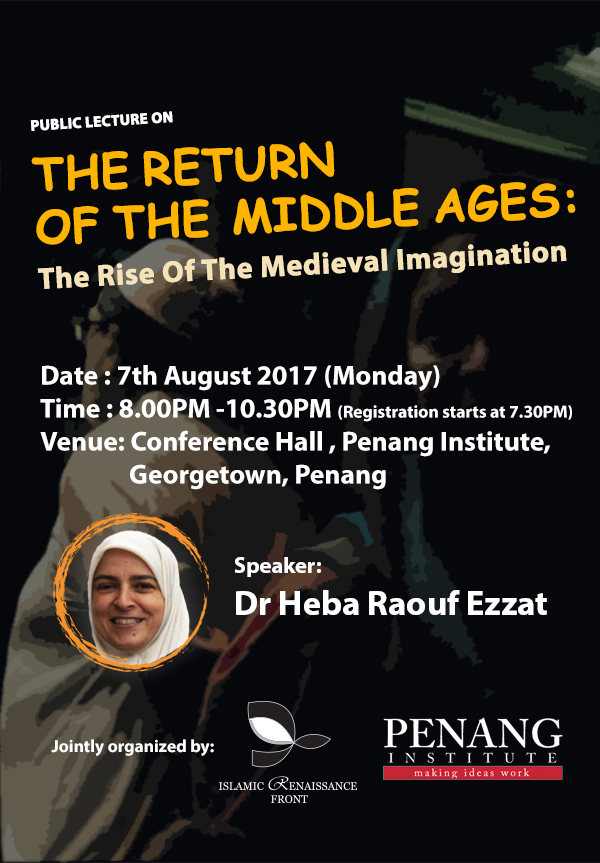Date: 7th August 2017
Time: 8PM – 1030PM
Venue: Conference Hall, Penang Institute, Georgetown, Penang
Register: https://www.eventbrite.com/e/public-lecture-on-the-return-of-the-middle-ages-the-rise-of-the-medieval-imagination-tickets-36258086914
Speaker:
Dr Heba Raouf Ezzat
Jointly organized by:
Penang Institute and Islamic Renaissance Front
The “caliphate” has always been a symbol of Islamic unity, piety, and prestige and has been the zeal of many Muslims across the world. The caliphate, as a political system has already been abolished twice. First time around was during the reign of the Abbasids after the destruction of Baghdad by the Mongols in 1258, while the second time was after the legislative abolition of the Ottoman caliphate by the nationalist Turkish assembly in 1924. Yet, among Muslims in modern times, many are still arguing for the Caliphate to be a form of a modern state. Could the movement for the re-establishment of a Muslim Caliphate manifest into a form of Muslim Zionism?
Modern historian, Dr Khalid Yahya Blankinship, argues that the Ottoman rulers did not generally refer themselves as Khalifahs even if that name may have been a part of their extended titular. Rather, they first and foremost called themselves Sultans, a title that appears to have been first introduced for the rulers by the Buyids from the Buyid dynasty (945-1055). The Ottomans also used other titles such as khaqan or hakan, an early non-Muslim Turkish title for ruler. The proof can be seen in the coins used by the Ottomans which states that the Ottomans are “sultan al-barrayn wa-khaqan al-bahrayn”; Sultan of the two lands (Europe and Asia) and Lord of the two seas (Black and Mediterranean). Yet the concept of caliphate re-emerged in 1774 as a means of defending the declining condition of the Ottoman state.
Dr Blankinship further proceeds by saying that the Sunnis have historically never validated the rule of the Khalifahs apart from the four Rāshidūns and, often, ‘Umar ibn ‘Abd al-‘Aziz (99-101/717-720). The state established by the Prophet Muhammad in Medina was extremely rudimentary and lacked any of the institutionalization connected with modern states. That is, while the Prophet was clearly and absolutely in charge, because of his direct connection with Allah through revelation and because of his good example, as amply proven in the Qur’an through frequent direct commands to obey him, no other offices seem to have existed until quite late in the Prophet’s career, and these were few.
Then, would it be sufficient to declare a state based on Sharia and later expect everything will be perfect? There has been a medieval imagination among many Muslims that a Sharia based state can be a quick fix to all problems plunging the Muslims, but they do not understand that the Sharia of classical times was not something imposed or enforced because the resources and means for the kind of intrusive enforcement used by modern states did not exist during that time. Though, it could be said that the supporters of the “Caliphate” in modern times, who want and urge for an authoritarian, authoritative, and institutional state, are innocent as they have not yet perceived the moral consequences of this choice of theirs. This issue is a political issue albeit a very delicate one.
Reflecting on the current state of the modern world where a lot of Muslims are bringing themselves to join and justify their allegiance to a Caliph, we must thus address this issue and try to go about understanding the consequences of having such a medieval imagination of a state reign by a Caliph under the pretext of Caliphate in the current time.
Programs
07.30-08.00: Registration
08.00-08.10: Speech by Chairperson, Elma Berisha
08.10-08.30: Speech by Dato’ Dr Ong Kee Beng, Executive Director, Penang Institute
08.30-09.30: Lecture on The Return of the Middle-Ages: The Rise of the Medieval Imagination by Dr Heba Raouf Ezzat
09.30-10.30: Discussion
1030: End
Biography
Dr Heba Raouf Ezzat graduated from Cairo University and taught at the political science department three courses of political theory and history of political thought for almost thirty years. She also was an affiliate professor at the American University in Cairo 2006-2013 where she taught courses on political Islam, contemporary Arab thought and political thought and theory. She was a visiting researcher then a visiting fellow at many distinguished academic institutions including University of Westminster , Oxford Center for Islamic Studies, Georgetown University, University of Maastricht, and University of California – Berkeley, and London School of Economics. She published widely on classic and contemporary Islamic thought, issues of Globalization, women and Islam, and urban politics. She has also been active in the public sphere in Egypt, was a coordinator of many youth initiatives and is a public speaker and commentator. She is also a translator and a poet. Her latest publications include two books in Arabic: Towards a New Civility and The Political Imagination of Islamists. Her translation of Ziauddin Sardar’s book on Mecca into Arabic is due to appear in bookstores September 2017.


